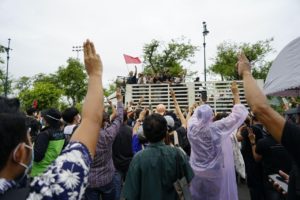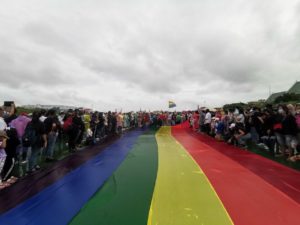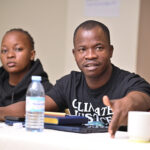This article was published more than 4 years ago.
A wave of more than 100 demonstrations has gripped Thailand for the past four months. Led by university students and including school children as young as 13, the protests are calling for Thai government and politics to reflect the voices and needs of all people in Thailand. Their primary demands are the dissolution of parliament, constitutional change, and an end to threats and harassment of citizens exercising their freedom of expression.
The protests have amassed support across class, gender, ethnic, and sexual orientation lines, uniting young people and activists who might not ordinarily work together. Some of the demonstrators are also focused on specific issues. Older students, for instance, say they want to be able to speak their minds at school, while younger students are seeking an end to corporal punishment. The LGBTQ community is calling for full marriage equality and defeat of a bill that would allow civil partnerships but not protect against discrimination broadly.
With support from the Fund, activists who for two years have been collecting signatures for a petition calling for constitutional change gained a huge platform. Their campaign gave protestors a ready-made, concrete action step as the protests ramped up. By the end of Saturday, September 19, the latest of the demonstrations, they had collected almost double the number of signatures needed to trigger legislative debate about constitutional change.
This most recent demonstration was held at Sanam Luang in Bangkok. Tens of thousands of people gathered, with speeches lasting well into the night, touching on the constitutional reforms as well as military mistreatment of civilians, economic gaps, and corruption. Some speakers also called for reform of the monarchy, shattering a taboo on publicly expressing anything but positive views about the institution and risking charges of breaking laws that protect the king and the royal family from any public criticism.
Protest leaders ended the peaceful demonstration on Sunday morning by giving a 10-point list of demands to the Bangkok police chief and calling for a general strike on October 14, the anniversary of a 1973 student uprising in Thailand.
This and previous protests in Thailand signal younger generations’ desire to have a stronger say in their country’s future. And they form an opportunity for community-based groups—like those supported by the Fund for Global Human Rights—to build on this groundswell and advance legislative and legal changes that create a more democratic process and protect citizens’ freedoms of speech and expression.

What’s Behind the Protests?
The student-led protests that kicked off in June were prompted by a series of compounding events, including frustration at corruption and the military’s influence over government and with the country’s COVID-19 response. The demonstrations reached one of their peaks on Monday, August 13, when thousands gathered in Bangkok. The students use social media, satirical riffs on corporate advertising, and pop culture references from Harry Potter and the Hunger Games to rally support and inspire discussion.
Since the 2014 military coup, Thailand has been a dangerous place to protest or express critical views of leadership. As a result, few perspectives or needs from marginalized communities ever make it to the corridors of power. Activists and community groups who speak up for the vulnerable do their work in an incredibly dangerous environment. Their efforts to expose corruption or press for expanding freedoms of expression carry high risks of arrest or physical attack.

Promoting Democracy in Thailand
The Fund supports more than a dozen community groups and human rights organizations based in Thailand. The demands being made by protestors touch on all the specific human rights challenges they are working on in the country. Communities should be consulted and give their consent before developers can use their land and natural resources. LGBTQ people deserve equal rights. And fundamental freedoms of expression, assembly, and association should be cornerstones of democracy.
In addition to efforts to further constitutional change, with the Fund’s support, other groups are giving the protests broad, accurate media coverage, countering misinformation, and ensuring that activists and protestors who are arrested receive legal representation.
Learn more about the Fund’s work in Thailand and follow us on Twitter, Facebook, and Instagram for up-to-date stories of human rights struggles and wins.
Header photo: Supanut Arunoprayote. Second and third photos courtesy of Prachatai.


